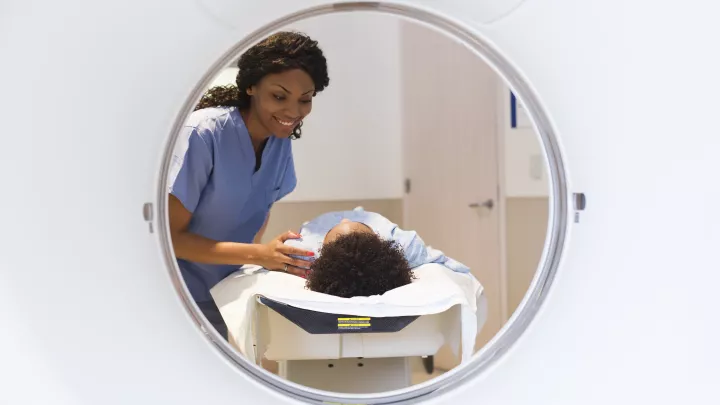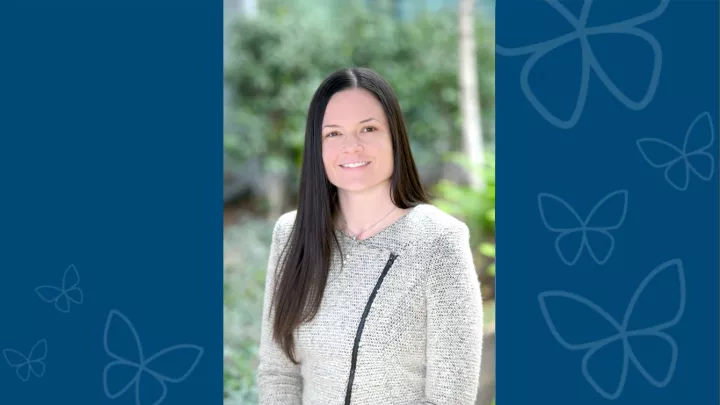Cystic Fibrosis Care Center
Cystic fibrosis is an inherited condition that causes thick, sticky mucus to build up in a child’s lungs. This mucus blocks airways, making it hard to breathe. The condition also affects digestion. Cystic fibrosis is a lifelong condition that requires advanced care from a team of specialists.
The Cystic Fibrosis Care Center at Children’s Hospital Los Angeles is one of the region’s most established and experienced centers. As a Cystic Fibrosis (CF) Foundation-accredited care center, we’re committed to providing the treatments, education and support your family needs. We provide comprehensive services to help your child enjoy life to the fullest.
Cystic Fibrosis Care Center: Why Choose Us?
Dedicated cystic fibrosis services are a specialized pulmonology offering at CHLA. U.S. News & World Report ranks our pediatric pulmonology and sleep medicine services among the country’s best.
At CHLA’s Cystic Fibrosis Care Center, your child benefits from:
- Latest cystic fibrosis treatments: We offer a full suite of treatments, including emerging modulator drugs, nutritional counseling, respiratory therapy and more. Our team customizes a treatment plan based on your child’s unique symptoms and needs.
- Access to research and clinical trials: Our center was one of the earliest members of the CF Foundation’s Therapeutics Development Network (TDN). We actively participate in research and clinical trials to advance cystic fibrosis care. Your child may benefit from promising new therapies not widely available elsewhere.
- Care for CRMS: We provide expert care for children who have CFTR-related metabolic syndrome (CRMS). These children have inconclusive test results and are at risk of developing a milder form of cystic fibrosis as they get older. This condition is also known as atypical cystic fibrosis.
- Collaborative team approach: Cystic fibrosis affects different body systems. We bring together specialists from different medical fields to manage all your child’s health care needs. To streamline care, we schedule appointments with multiple specialists during the same visit. Meet our team.
- Focus on education and self-sufficiency: Our care team helps children 8 and older take charge of their health. With each visit, your child learns more about managing their care. When the time comes, we help your child make the transition to adult services. Teens and young adults may choose to receive care at our affiliate, the USC Anton Yelchin Cystic Fibrosis Clinic, or another center.
- Support for the whole family: We foster strong relationships with families, ensuring your family has the necessary resources and support to manage this lifelong condition. We also host an annual Cystic Fibrosis Education Day that brings families and specialists together.
What Causes Cystic Fibrosis?
Children with cystic fibrosis inherit a changed (mutated) cystic fibrosis transmembrane conductance regulator (CFTR) gene from each parent. These gene mutations affect the CFTR protein, which moves chloride (a salt component) in and out of cells. Typically, chloride attracts water to a cell’s surface. When the protein doesn’t work as it should, there’s less water. Thick, sticky mucus builds up in cells in the lungs, pancreas and other organs.
This mucus can:
- Block airways and damage the lungs, affecting breathing
- Trap germs, increasing the risk of lung infections
- Affect the body’s ability to absorb fats and nutrients, leading to malnutrition
Everyone has two copies of the CFTR gene. A parent may have one mutated CFTR gene and not have cystic fibrosis. They are carriers. Carriers can unknowingly pass the mutated gene to their children. A child must inherit a mutated CFTR gene from both parents to develop cystic fibrosis. A child who inherits one mutated gene is a carrier. They do not have cystic fibrosis, but can pass the gene change to their children.
Expert Cystic Fibrosis Diagnosis
We offer comprehensive cystic fibrosis testing. Our team performs these tests to get an accurate cystic fibrosis diagnosis:
Newborn screening
All 50 states and the District of Columbia perform newborn screenings for cystic fibrosis, although the test methods may vary. A newborn screening takes place 24 to 48 hours after your baby’s birth. A provider takes a small blood sample from your baby’s heel. A lab screens the blood sample for a variety of conditions, including cystic fibrosis. Your family may come to our center if the test indicates cystic fibrosis. Our nurse care manager helps schedule additional testing.
Genetic testing
A gene test is a specialized blood test that checks for the CFTR gene mutation that causes cystic fibrosis. Some newborn screenings include this gene test. Parents and other family members may also get this test to see if they carry the mutated gene. Our Division of Medical Genetics offers genetic testing, genetic counseling and other services.
Sweat test
A sweat test measures the amount of chloride in your child’s sweat. Children born with cystic fibrosis have higher-than-usual sweat chloride levels.
During a sweat test:
- Your child’s provider places a small disk that contains a safe chemical called pilocarpine on the skin of your child’s arm or leg. The disk is held in place with a soft band.
- The provider connects the disk to a machine that delivers mild electric currents to the skin, inducing sweat. Electrical stimulation may tingle, but it isn’t painful.
- The electric current runs for 5 minutes; then the disk is removed.
- Your child’s provider seals a new disk around the test site and wraps it and your child’s skin in plastic wrap to trap sweat for 30 minutes. You can hold, feed and engage with your child during this time.
- After 30 minutes, your child’s provider inserts a needle into the collection disk to draw out the sweat sample. The needle doesn’t touch your child’s skin.
- The sample is analyzed for sweat chloride levels. High levels may indicate cystic fibrosis.
Post-diagnosis tests
After a cystic fibrosis diagnosis, your child may get these tests to assess their lung health:
- Chest CT scan
- Chest X-ray
- Pulmonary function tests
- Sputum (mucus) culture to check for bacterial infections
Comprehensive Cystic Fibrosis Treatments
Cystic fibrosis affects every child differently. We customize a care plan that meets your child’s unique needs. As an accredited cystic fibrosis center, we offer the latest treatments, including:
CFTR modulator therapies and other medications
We offer the latest medication therapies for children with cystic fibrosis:
- CFTR modulator therapies: CFTR modulator drugs correct a mutation in the CFTR protein. Your child must have these precise mutations for the drug to work. We offer all FDA-approved CFTR modulator therapies.
- Antibiotics: Antibiotics treat lung bacterial infections, such as pneumonia. Depending on the severity of the lung infection, your child may need oral, inhaled or IV antibiotics.
- Inhaled medications: An inhaled bronchodilator medication relaxes muscles around the airways and helps clear mucus from the lungs. Other types of inhaled medications thin out mucus, making it easier to expel.
- Pancreatic enzyme supplements: Thick mucus can affect the release of enzymes from the pancreas that aid digestion. Your child may need to take a pancreatic enzyme supplement before each meal to help their body break down foods and absorb nutrients.
Airway clearance techniques
Our pediatric respiratory care practitioners teach you and your child airway clearance techniques. These methods clear mucus from your child’s lungs and open airways.
Airway clearance techniques include:
- Active cycle of breathing techniques: Your child performs breath control, chest expansion and huffing exercises. These exercises relax their airways, bring air into their lungs and force mucus out of their lungs.
- Autogenic (self) drainage: Your child learns to use large exhalations to clear mucus from their lungs.
- Chest physical therapy: Your child uses different body positions, vibrations, clapping and breathing exercises to drain mucus from their lungs.
- Huffing: Your child inhales and holds their breath. They then forcefully exhale in a continuous huff (cough).
Nutritional counseling
Children with cystic fibrosis use more energy to breathe, fight infections and digest food. Your child may need up to twice as many daily calories as their peers to support these body functions. Your child’s digestive system also doesn’t break down and absorb nutrients and fats from foods as well as it should.
Our registered dietitian nutritionists (RDNs) work with your family to ensure your child gets the calories and nutrients they need to grow and thrive. Learn more about our clinical nutrition services.
Cystic Fibrosis Research and Clinical Trials
CFTR modulator medications have transformed the care of many children with cystic fibrosis. However, children from diverse racial and ethnic backgrounds, such as Latinx patients, often have different gene mutations that the drugs don’t target. Our specialists treat a high volume of children who don’t benefit from current CFTR modulator drugs.
This experience, combined with our involvement in the CF Foundation’s Therapeutics Development Network, is helping our team actively research alternative modulator drugs and gene therapies. We’re also looking for new ways to prevent and treat airway and lung infections in all children with cystic fibrosis.
Multidisciplinary Cystic Fibrosis Care Team
Children with cystic receive coordinated care from a team of experts from various medical specialties. In addition to pulmonologists, your child’s care team may include:
- Gastroenterologists (digestion specialists)
- General pediatric surgeons
- Infectious disease specialists
- Otolaryngologists (ear, nose and throat specialists)
Other care team members may include:
- Advanced practice providers
- Child Life specialists
- Nurses and nurse care managers
- Pharmacists
- Physical and occupational therapists
- Psychologists
- Registered dietitian nutritionists (RDNs)
- Respiratory care practitioners
- Social workers
Pulmonology and Sleep Medicine Care at Children's Hospital Los Angeles
Our expert team of pulmonology and sleep medicine specialists diagnoses and manages all types of breathing, lung and sleep issues in children. Learn more about our leading-edge Pulmonology and Sleep Medicine services.
Contact us
Pulmonology and sleep medicine experts at CHLA welcome new patients, referrals and second opinions. Please contact us:
- Phone: 323-361-2287
- Online: Make an appointment
- Second opinions: onlinesecondopinion@chla.usc.edu or visit Online Second Opinions


